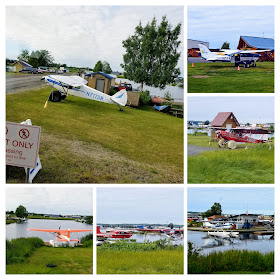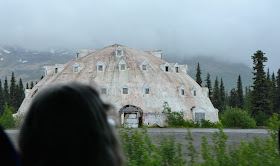Anchorage, Alaska’s largest city, is in the south-central part of the state on the Cook Inlet. It is Alaska's most populous city and contains more than 40% of the state's population; among the 50 states, only New York has a higher percentage of residents who live in its most populous city. It has more than 60 glaciers within 50 miles of downtown, a salmon stream in the heart of the city, 300 miles of wilderness trails and Chugach State Park and National Forest one of the largest state parks. Anchorage is known for its cultural sites, including the Alaska Native Heritage Center, which displays traditional crafts, stages dances, and presents replicas of dwellings from the area’s indigenous groups. The city is also a gateway to nearby wilderness areas and six surrounding mountains including the Chugach, Kenai, and Talkeetna. When we departed the Alaska Railroad on the land portion of our Alaskan Cruise--click here to read that post--we were checked into the Captain Cook Hotel. Although it was the evening, the almost 24-hour daylight of the Alaskan summer made it look like mid-day. This was our view of Anchorage from our hotel window! (All photos will enlarge if clicked on)
Our stomachs told us we were hungry after our day of travel and we ate dinner in the hotel, enjoying fried calamari and a steak. Both were delicious!
We were only spending one night in the hotel with our tour and so even though it was late we took a walk around the downtown, where my husband posed with a local "bear." We saw Cook's inlet in the distance and numerous extra-large lilac bushes. Our visit to Anchorage took place in June and lilacs were everywhere! Their beautiful scent is one of my fond memories of Alaska. The long daylight hours of summer helps flowers grow, even if the spring and summer seasons are short. We were told by a tour guide that Alaska also often wins prizes for growing the largest vegetables due to the extra-long sunlight hours.
The next morning, we took a highly recommended one hour Anchorage Trolley Tour which we picked up at this unique location. Our tour guide was very entertaining! She sang, told jokes and local sayings as well as pointed out the interesting sights. One of the sayings we heard often in Alaska was: "The odds are good, but the goods are odd." That means that there are more men than women living in Alaska, but often the men that are there are also "unusual or unique," putting it kindly.
Our trolley window view of the bronze Captian Cook Monument in Resolution Park. The bronze Captain Cook Monument has the famed explorer standing on a large wooden deck, looking out to sea -- toward the route he used when he explored Cook Inlet in 1778 aboard HMS Resolution. Captain Cook was searching for a Northwest Passage and never actually reached Anchorage. He sent his ship's master, William Bligh instead. After two weeks of exploration of the channel, he was happy to leave the area
On another trolley stop, we looked at this driveway, glass canopy and skylight set into the ground. What is this? Underneath the ground is a 2,800 square feet house! Jon and Marnie Isaacs have lived in this house, and raised their family there, for almost 40 years. To read why and how this house was built, click on this link from the Anchorage Daily News.
Next stop on the trolley we saw Earthquake Park in the Turnagain neighborhood. This 134-acre park is set in the woods where, in 1964, on March 27, during Good Friday, last century's most powerful earthquake occurred in Anchorage, Alaska. The earthquake was measured at a 9.2 on the Richter scale and lasted 4 minutes, killing 115 people and causing $116 million in damages ($0.73 billion in 2018 dollars. This tragic event is commemorated in Anchorage’s Earthquake Park, where there are signs explaining the circumstances of the quake and its effect on the area. If you examine my photo you can see wave-like ripples on the ground that was a result of the earthquake.
A view of downtown Anchorage from the park.
Next, we stopped at Lake Hood, where we saw the favorite mode of transportation for Alaskans--the seaplane! The sound of seaplanes is another Alaskan memory I will cherish, even if they can be quite noisy! To hear a seaplane taking off click on this link which will take you to my Mille Fiori Favoriti facebook page where you will see my short video link--click on the photo in that link and it will enlarge and begin to play--make sure the sound is turned on! You will hear the plane take off from the water and the tour guide's voice. She was telling us about a local lady who just posted a photo on facebook of a moose that was in her back yard! There are estimated 1,000 moose that roam freely in the Anchorage area! Unfortunately, we didn't see any on our hour-long tour.
More sights of Anchorage. A seaplane and the beautiful Chugach Mountains in the distance, more lilacs, the fencing surrounding some areas in an attempt to keep control of the moose, and the air full of commercial jets and seaplanes.
All too soon it was time to leave Anchorage and get on a bus that was to take us to Whittier, Alaska and our cruise ship. We loved Anchorage and would love to return for a much longer visit and see more of its sights. As Anchorage has a major airport and the Alaska Railroad, it is a wonderful location to begin a trip to see Alaska on one's own. Just look at the scenery that surrounds the city! Now that's what you think of when you think of Alaska! Don't you agree?
I wasn't sitting in the right side of our tour bus to see the best views of the Chugach Mountains but even so, look at the views we saw!
We watched the bears for quite a while!
I loved when he sat down among the wildflowers!
A Muskox
Sitka Black-Tailed Deer and Elk
Elk in Alaska are limited to island habitats with temperate, maritime climates. They feed on a variety of plants at different times of the year. During the summer months, they favor grasses, forbs, willows, and other leafy greens while in the winter they munch on branches and twigs of trees and shrubs.
Moose
Only males or bull moose have antlers. Most male moose calves develop bony knobs on their heads by the end of their first summer. After the first year, they grow antlers every summer and shed them during the winter. This moose seemed to be resting due to the midday heat--on our visit to this Wildlife Center, the temperatures were close to 80 degrees!
There were other animals in the wildlife center, but many were hiding from the heat or inside their shelters. There are owls, wolves, bison, lynx, fox, reindeer, and wolverines. We also enjoyed the beautiful scenery surrounding the wildlife center and gift shop and cafe.
If you watch this YouTube you will experience the Whittier Anton Anderson Memorial Tunnel—The tunnel's portal is made of 14 inches of concrete and was designed to withstand a major avalanche. The tunnel goes through Maynard Mountain for 13,300 ft. (2.5 miles) and is the longest combined rail and highway tunnel in North America. The first tunnel designed for -40 Fahrenheit temperatures and 150 mph winds!
The one-lane tunnel must be shared by cars and trains traveling in both directions. This unique design enables a single lane of traffic to travel directly over the railroad track and saved tens of millions of dollars over the cost of constructing a larger tunnel.
You can also find me on
I'm linking this post to the following blog events:
Mosaic Monday, All Seasons, Blue Monday, Through My Lens Monday, Little Cottage Link Party, Blogging Grandmothers, Hearth, and Soul Link Party, You Are the Star Blog Hop, Good Random Fun, Nature Notes, Grand Social, Travel Photos, Photo Tunes, Happiness Is Homemade, Something Old Is New, Our World Tuesday, Ruby Tuesday, Tuesdays With A Twist, Wordless Wednesday on a Tuesday, Say Cheese!, Party in Your PJ's, Wordless Wednesday, Nanahood WW, Oh My Heartsie Girl's Wonderful Wednesday, Your Whims Wednesday, Worldless Wednesday at Sky Girl, Wednesday My Corner of the World, Wonderful Wednesday, Little Things Thursday,Thankful Thursday, Thursday Encouraging Hearts and Home, Thursday Favorite Things, Friendship Fridays, Friday Features Linky Party, Friday Photo Journal, Skywatch Friday, Pink Saturday, Saturday Critters,
Over the Moon Grammys Grid-Month Long Linky Party























































